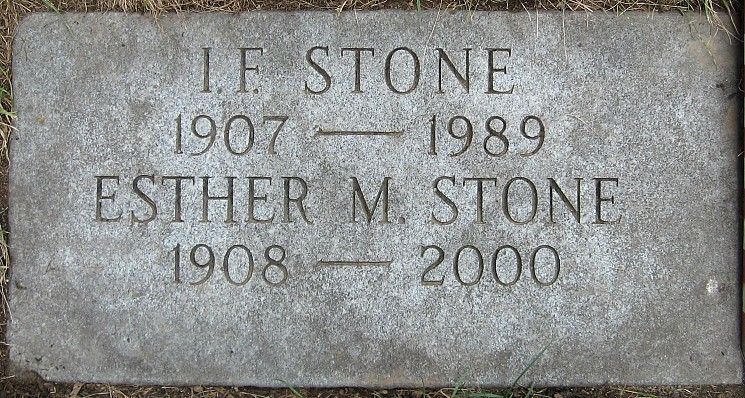
I. F. “Izzy” Stone (1907-1989)
Investigative Reporter, Journalist, & Publisher
Best known as an investigative reporter, journalist and publisher, I. F. Stone was born on December 24, 1907.
Originally born in Philadelphia, Pennsylvania as Isidor Feinstein, I. F. Stone was raised in New Jersey by his parents who were Russian Jewish immigrants. As a New Jersey schoolboy, he published his first newspaper at the age of 14. He went on to study philosophy at the University of Pennsylvania, where he wrote for The Philadephia Inquirer. At the age of 25, he became the youngest editorial writer at a major newspaper to speak out against Hitler’s growing power. He was deemed a liberal radical in the 1930s and began to mingle with well known figures such as Chaplin, Welles, Thurber, Hellman and Hammett. In 1933 he started working for the New York Post and in 1937 he published The Court Disposes, a book that focused on the role of the Courts in shaping New Deal reforms. During this time, Isidor changed his name to I. F. Stone upon receiving advice from an editor that having a less Jewish sounding name would make his political writings more legitimate.
After moving to Washington D.C. in 1940 to become the Washington editor of The Nation, Stone exposed U.S. corporations that were still doing business with Hitler’s Germany. In 1941 he published his next book, Business as Unusual, as a critique on the country’s preparations for war. While writing for The Nation, Stone wrote an exposé on the FBI that revealed racism and inappropriate questioning that was meant to seek out civil servants deemed by the FBI as threats to the government. While Stone received praise for his work, The Nation was criticized for letting him conceal his sources. To his credit, Stone never stopped speaking out against secrecy in government. However, being this outspoken came with a price- Stone was ridiculed by J. Edgar Hoover, bugged by the FBI, investigated by the CIA, the State Department, Army, IRS and the US Post Office. The FBI even amassed a 5,000 page spy file on Stone.
In 1946, he was fired from The Nation when it was discovered that he was working as a foreign correspondent for the newspaper PM, where he covered The Jewish Resistance Movement in what was then the British Mandate of Palestine. He strongly supported the creation of the State of Israel and the Zionist Movement, though in later years he became sympathetic to the plight of Palestinian Arabs. After undergoing numerous name changes, PM finally went out of business for good in 1952. Having been blacklisted in 1950, Stone found it hard to find work. But he did find inspiration from another blacklisted writer who had his own weekly. And so in 1953, with only $6,500, Stone launched his own newspaper, I.F.Stone’s Weekly, which he and his wife produced from their home in Washington. Almost immediately, it achieved a nationwide reputation for its spirited anti-McCarthyism. At its peak in the 1960s, it had a circualtion of almost 70,000. Unfortunately, illness forced Stone to retire in the early 1970s. He used this time to learn ancient Greek and to research the life of Socrates. He used all of this new research to write a book, The Trial of Socrates, where he argued that Socrates ultimately wanted to be put to death in order to prove a point.
Stone received many awards and honors for his credible investigative journalistic style. They include a Special George Polk Award in 1970 and the Conscience-in-Media Award from the American Society of Journalists and Authors in 1976. I.F. Stone Weekly was ranked 16th in a poll of his fellow journalists of “The Top 100 Works of Journalism in the United States in the 20th Century”. The Nieman Foundation for Journalism at Harvard University awards an annual medal in his name for journalistic independence. And in 2008, the Izzy Award was created by the The Park Center for Independent Media and is presented to “an independent outlet, journalist, or producer for contributions to our culture, politics, or journalism created outside traditional corporate structures”.

I. F. Stone is buried at Mount Auburn in Lot 163 on Walnut Avenue.
